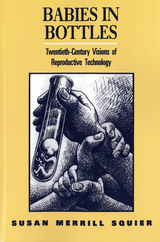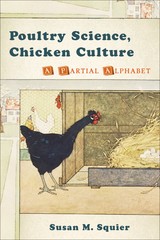3 books about Squier, Susan M.

Babies In Bottles
Susan Merrill Squier
Rutgers University Press, 1994
There is a forgotten history to our current debates over reproductive technology - one interweaving literature and science, profoundly gendered, filled with choices and struggles. We pay a price when we accept modern reproductive technology as a scientific breakthrough without a past. Babies in Bottles retrieves some of that history by analyzing the literary and popular science writings of Julian Huxley, J.B.S. Haldane, Charlotte Haldane, Aldous Huxley, and Naomi Mitchison - writings that include representations of reproductive technology from babies in bottles to surrogate mothers. It is to these images, fantasies, practices, and narratives of scientific intervention in reproduction that we must look if we want to understand what acts of ideological construction have been carried out, and are currently being performed, in the name of reproductive technology. Susan Merrill Squier shows how the imaginative construction of reproductive technology helps to shape our contemporary practices. Susan Merrill Squier is Julia Gregg Brill Professor in Women's Studies and English at the Pennsylvania State University, University Park. She is the author of Virginia Woolf and London: The Sexual Politics of the City, editor of Women Writers and the City: Essays in Feminist Literary Criticism, and co-editor of Arms and the Woman: War, Gender, and Literary Representation.
[more]

Health Humanities Reader
Jones, Therese
Rutgers University Press, 2014
Over the past forty years, the health humanities, previously called the medical humanities, has emerged as one of the most exciting fields for interdisciplinary scholarship, advancing humanistic inquiry into bioethics, human rights, health care, and the uses of technology. It has also helped inspire medical practitioners to engage in deeper reflection about the human elements of their practice.
In Health Humanities Reader, editors Therese Jones, Delese Wear, and Lester D. Friedman have assembled fifty-four leading scholars, educators, artists, and clinicians to survey the rich body of work that has already emerged from the field—and to imagine fresh approaches to the health humanities in these original essays. The collection’s contributors reflect the extraordinary diversity of the field, including scholars from the disciplines of disability studies, history, literature, nursing, religion, narrative medicine, philosophy, bioethics, medicine, and the social sciences.
With warmth and humor, critical acumen and ethical insight, Health Humanities Reader truly humanizes the field of medicine. Its accessible language and broad scope offers something for everyone from the experienced medical professional to a reader interested in health and illness.
In Health Humanities Reader, editors Therese Jones, Delese Wear, and Lester D. Friedman have assembled fifty-four leading scholars, educators, artists, and clinicians to survey the rich body of work that has already emerged from the field—and to imagine fresh approaches to the health humanities in these original essays. The collection’s contributors reflect the extraordinary diversity of the field, including scholars from the disciplines of disability studies, history, literature, nursing, religion, narrative medicine, philosophy, bioethics, medicine, and the social sciences.
With warmth and humor, critical acumen and ethical insight, Health Humanities Reader truly humanizes the field of medicine. Its accessible language and broad scope offers something for everyone from the experienced medical professional to a reader interested in health and illness.
[more]

Poultry Science, Chicken Culture
A Partial Alphabet
Squier, Susan M
Rutgers University Press, 2010
Poultry Science, Chicken Culture is a collection of engrossing, witty, and thought-provoking essays about the chicken-the familiar domestic bird that has played an intimate part in our cultural, scientific, social, economic, legal, and medical practices and concerns since ancient Egypt, Greece, and Rome. Organized as a primer, the book reaches beyond narrow disciplines to discover why individuals are so fascinated with the humble, funny, overlooked, and omnipresent chicken.
Spanning fascinating and diverse fields, Susan Merrill Squier assesses the chicken as the focus of film, photography, and visual art in many media; details some of the roles played by chickens and eggs in the development of embryology, biology, and regenerative medicine; traces the iconic figure of the chicken (and the chicken thief) in political discourse during the 2008 presidential election; demonstrates the types of knowledge that have been lost as food production moved from small-scale farming to industrial agriculture; investigates the connection between women and chickens; analyzes the fears and risks behind the panic around avian flu; and scrutinizes the role of chicken farming in international development. A combination of personal passion and surprising scholarly information, Poultry Science, Chicken Culture will change forever the way you think about chickens.
Spanning fascinating and diverse fields, Susan Merrill Squier assesses the chicken as the focus of film, photography, and visual art in many media; details some of the roles played by chickens and eggs in the development of embryology, biology, and regenerative medicine; traces the iconic figure of the chicken (and the chicken thief) in political discourse during the 2008 presidential election; demonstrates the types of knowledge that have been lost as food production moved from small-scale farming to industrial agriculture; investigates the connection between women and chickens; analyzes the fears and risks behind the panic around avian flu; and scrutinizes the role of chicken farming in international development. A combination of personal passion and surprising scholarly information, Poultry Science, Chicken Culture will change forever the way you think about chickens.
[more]
READERS
Browse our collection.
PUBLISHERS
See BiblioVault's publisher services.
STUDENT SERVICES
Files for college accessibility offices.
UChicago Accessibility Resources
home | accessibility | search | about | contact us
BiblioVault ® 2001 - 2024
The University of Chicago Press









